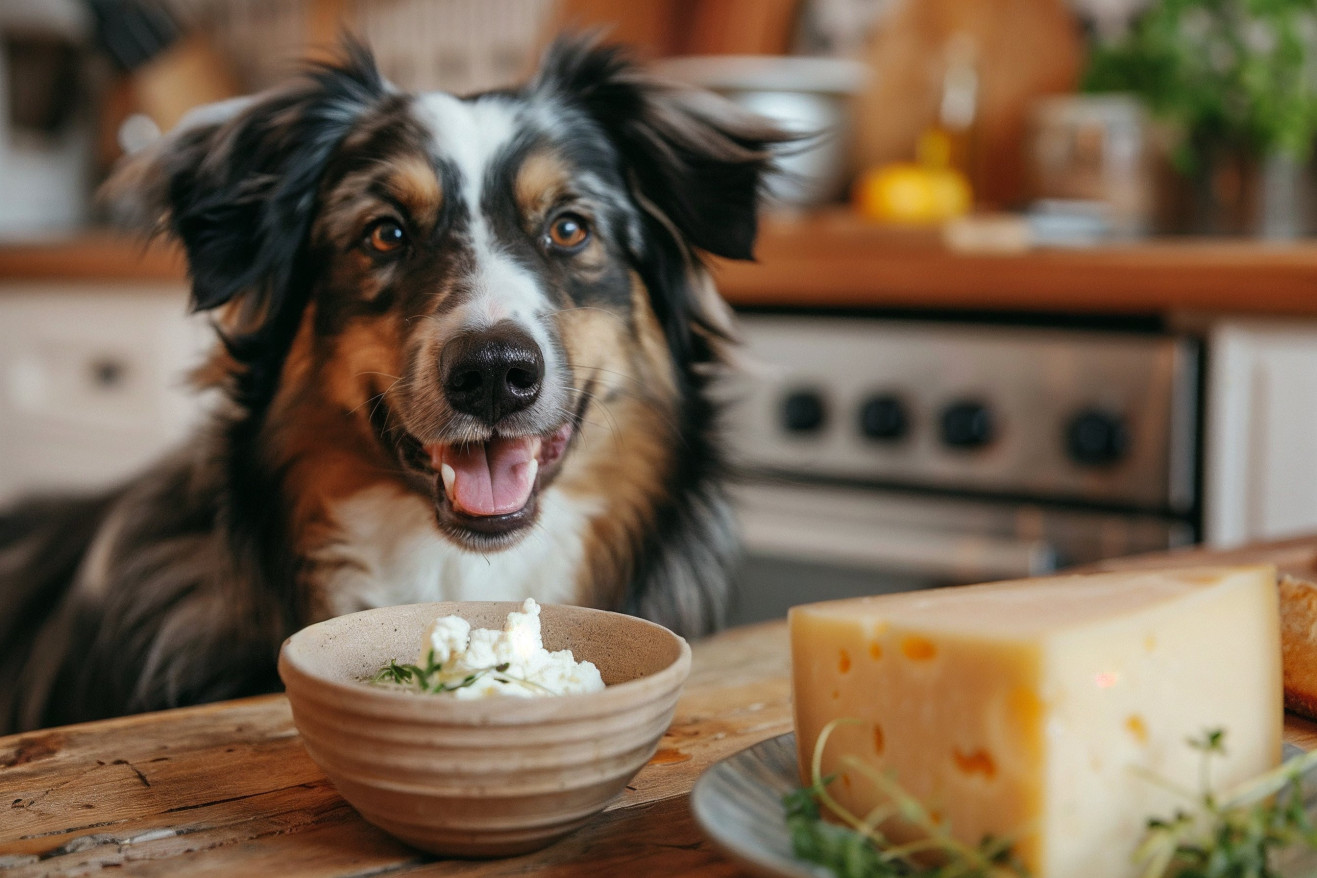Can Dogs Eat Goat Cheese? Nutritional Facts and Vet Advice
13 March 2024 • Updated 13 March 2024

If you’re a fan of goat cheese, you may have found yourself wondering whether your dog can eat it too. The good news is that dogs can have goat cheese in moderation and it can be a good source of protein, vitamins, and minerals.
However, because of its lactose content, it’s not suitable for dogs that are lactose intolerant and it may lead to digestive issues. That said, you should always talk to your vet before giving your dog goat cheese.
This article will use information from veterinarians and nutritional science to help you better understand the ins and outs of giving goat cheese to your dog. By looking at the research of veterinary nutritionists and what dogs need in their diets, we’ll cover the pros and cons of this dairy product. This will help you decide whether or not to give your dog goat cheese.
Can dogs eat goat cheese?
Nutritional Facts of Goat Cheese for Dogs
When given in moderation, goat cheese can be a healthy snack for dogs. According to DogTime, goat cheese is a good source of protein, which is important for muscle growth and repair, and fatty acids, which are important for metabolizing fat. Meanwhile, magnesium helps with enzyme function and bone health, and calcium and phosphorus are important for bone strength. Meanwhile, B vitamins are important for energy and a healthy nervous system.
Studies have shown that goat cheese has higher levels of these nutrients and lower levels of lactose than other cheeses like cheddar or mozzarella. This means that goat cheese may be a better option for dogs that are lactose tolerant. However, because of its high fat content, goat cheese should be given in moderation and not as a regular part of a dog’s diet.
Veterinarians recommend that the amount of goat cheese a dog can have should be based on the dog’s age, size, and health. It’s also important to introduce goat cheese to a dog’s diet slowly and carefully and to watch for any signs of digestive issues or allergies. This way, you can make sure that your dog can safely enjoy this delicious treat.
Lactose Intolerance in Dogs
Like humans, many dogs are lactose intolerant. According to Wag Walking, most dogs stop producing the enzyme that breaks down lactose after they are puppies, which can lead to symptoms like gas, bloating, diarrhea, and vomiting.
While goat cheese has less lactose than other dairy products, it still contains the milk sugar, just in smaller amounts. As Healthline explains, goat milk has about 4.20% lactose, which is less than the nearly 5% in cow’s milk. As a result, goat cheese has less lactose, which may be easier for some dogs to digest.
To find out if your dog can tolerate lactose, give them a small amount of goat cheese and see if they have any digestive issues. If your dog has gas, bloating, or diarrhea, they may be lactose intolerant.
If you know your dog is lactose intolerant, look for dairy-free dog treats. According to PetMD, lactose-free or plant-based milk alternatives are good options. It’s important to make sure that dogs who are lactose intolerant are getting the nutrients they need without the discomfort that lactose can cause.
Consider the Risks: When Goat Cheese Can Be Bad for Dogs
Although goat cheese can be a delicious snack for dogs, it’s also important to consider the potential health risks. The American Kennel Club notes that high-fat foods like cheese can lead to obesity and increase a dog’s chances of developing pancreatitis. Because goat cheese is high in calories, it should be fed in moderation to prevent weight gain and other health issues.
PetMD also warns that the proteins in goat cheese can cause allergic reactions, including itching and digestive issues, in some dogs. In addition, some goat cheese products contain ingredients that are toxic to dogs, such as garlic or chives. To avoid any potential problems, only feed your dog plain, unseasoned goat cheese and stay away from any products that contain ingredients that could be dangerous to your pet.
If your dog experiences any negative symptoms after eating goat cheese, including vomiting, diarrhea, or skin problems, contact your vet right away. By making sure you’re choosing the right products and watching your dog’s response, you can make sure that goat cheese continues to be a safe and enjoyable treat for your furry friend.
Training and Medication with Goat Cheese
Goat cheese can be a great high-value treat for dog training, as its strong flavor can be used to reward positive behavior. Blue Cross notes that using cheese in this way can be especially effective when it’s used in moderation, as it can help dogs understand the pleasure that comes from certain behaviors, like a good recall.
Goat cheese’s strong flavor makes it a great option, but it’s important to use it in a way that’s mindful of an individual dog’s health and dietary needs.
Goat cheese can also be a good way to give dogs their medications. If a dog is resistant to taking a pill, it can be hidden in a small piece of goat cheese to make it easier for the dog to swallow.
However, this may not be a good option for dogs that are lactose intolerant, and in these cases, it’s important to find an alternative. Dairy-free or lactose-free treats may be just as effective without causing stomach upset.
As with any treat, it’s important to use goat cheese in training and medication in moderation. Treats should make up no more than 10% of a dog’s daily calories to avoid throwing off their diet. By following these rules, you can make sure that goat cheese has a positive impact on your dog’s training and health without negatively impacting their overall well-being.
Final Thoughts on Giving Your Dog Goat Cheese
If your dog enjoys the taste of goat cheese, it can be a good source of protein, fatty acids, and vitamins. However, it should be used in moderation. When you first start giving it to your dog, you should do so with the help of a vet to make sure that your dog isn’t lactose intolerant or sensitive to dairy.
While there are many nutritional benefits to goat cheese, it’s important to remember that there are also risks, including the potential for obesity and pancreatitis due to the high fat content and the potential for allergic reactions. The best goat cheese to give your dog is plain and unseasoned, as this will ensure that it doesn’t contain any ingredients that could be harmful to your dog.
Part of being a good pet owner is paying attention to your dog’s individual needs and reactions. Make sure to monitor your dog for any signs of distress after they eat goat cheese to make sure that it continues to be a positive addition to their diet.
As you come to the end of your dog’s dietary regimen, remember that giving them goat cheese and other treats in a responsible way can help you have a happy, healthy, and well-behaved dog.


